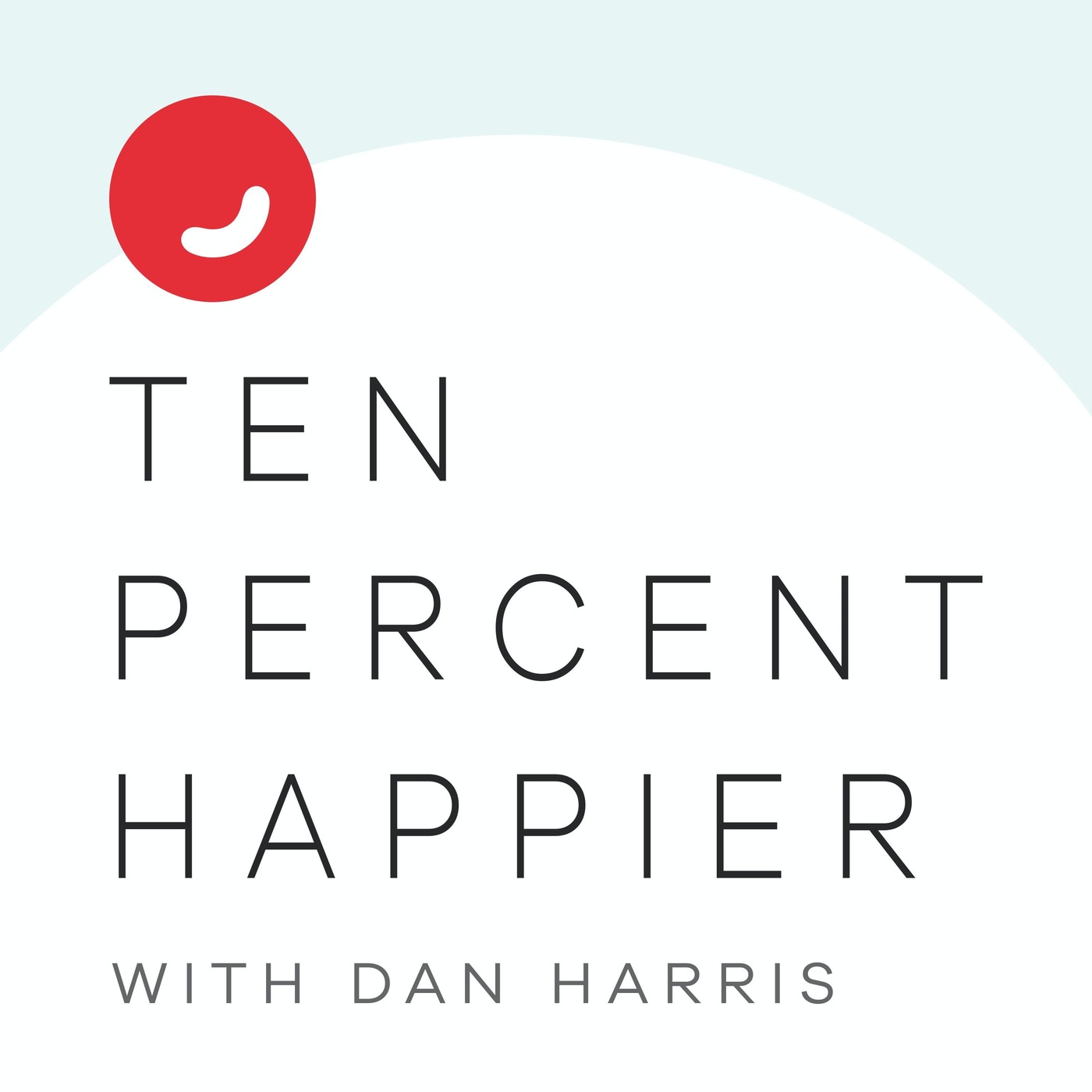Podcast Summary
Embracing uncertainty and groundlessness with Pema Chodron: Pema Chodron encourages us to welcome the unwelcome, befriend our demons, sympathize without being stupid, and lighten up in the face of fear during uncertain times.
Pema Chodron, the guest on the 10% Happier podcast, emphasizes the importance of embracing uncertainty and groundlessness, which have become increasingly relevant in our current crisis. Despite her lighthearted and humorous demeanor, she encourages us to welcome the unwelcome, befriend our demons, sympathize without being stupid, and lighten up in the face of fear. Pema, who was born Deirdre Blumfield in Connecticut and became a nun after a rough divorce, now lives in rural Nova Scotia and is the director of Gampo Abbey. She has written numerous books on these topics and is known for her ability to make meditation practices applicable to all aspects of life. Amidst the current pandemic, she and her community at Gampo Abbey are sheltering in place and staying aware of the situation while continuing their practices.
Practice self-awareness, acceptance, and compassion: Embrace uncertainty, welcome the unwelcome, and cultivate self-acceptance through meditation to build resilience and grow during challenging times.
During challenging times, it's essential to practice self-awareness, acceptance, and compassion towards ourselves and others. This can be achieved through meditation, which helps us acknowledge our habitual patterns without judgment and cultivate a kind and open heart and mind. By starting with self-acceptance and making friends with our inner experiences, we can build resilience and be of benefit to those around us. As the speaker emphasizes, embracing uncertainty and welcoming the unwelcome are keys to navigating difficult times. These practices not only help us cope with adversity but also allow us to grow and become stronger individuals.
Cultivating self-compassion for resilience: Practicing self-compassion through meditation and self-awareness can help us make friends with our inner demons, navigate difficult emotions, and become more resilient during challenging times.
Embracing discomfort and uncertainty through self-compassion and self-awareness can lead to resilience and openness towards others. This practice, which can involve techniques like loving-kindness meditation, allows us to make friends with our inner demons and develop a sense of humor about our negative patterns. By cultivating warmth and kindness towards ourselves, we become better equipped to handle difficult emotions during challenging times. This approach, rooted in both Tibetan and Theravada Buddhist traditions, can help us navigate periods of isolation, fear, and anxiety with greater ease.
Embrace challenges with warmth and resilience: During hardships, recognize their potential for self-discovery and growth, rather than resisting or viewing negatively.
During challenging times, it's essential to maintain a sense of warmth and resiliency towards the situation, rather than resisting it or viewing it negatively. This perspective, inspired by the teachings of Kogem Trumpa, suggests that crises can offer opportunities for self-discovery and acknowledgement of life's impermanence. By befriending difficult emotions and embracing the uncertainty, we can develop greater resilience and appreciate the preciousness of life. This approach doesn't mean welcoming suffering or hardships as good news, but rather recognizing the potential for growth and transformation within the chaos. Ultimately, embracing the ebb and flow of life's challenges can lead to a deeper understanding of ourselves and the world around us.
Life's impermanence and interconnectedness: The pandemic crisis highlights life's unpredictability and our interconnectedness, offering an opportunity for growth and change.
Life's impermanence and interconnectedness are fundamental truths that the current pandemic crisis has brought to the forefront. Many people have realized that their carefully planned schedules and engagements can be upended at any moment. This realization can lead to a deeper connection with life and empathy for others' suffering. However, it's easy to slip back into denial and old habits. The crisis presents an opportunity for growth and change, but it's up to individuals to seize it. The human tendency towards denial makes it a challenge to fully accept these truths, but recognizing them can lead to a more profound understanding of life. Ultimately, the choice is ours to either grow from this experience or return to our old ways.
Practice empathy and compassion towards those with differing beliefs: Understand that people's behaviors often stem from pain and fear, separate the person from their actions, and acknowledge their potential for growth and change.
During times of polarization, it's essential to practice empathy and compassion towards those whose beliefs or actions differ significantly from ours. It's natural to want to resist change and close ourselves off, but this can lead to more suffering for ourselves and others. Instead, we should strive to understand that people's behaviors often arise from pain and fear, even if we disagree with their methods. By separating the person from their actions, we can maintain our own moral compass while acknowledging the potential for growth and change in others. This perspective, as discussed, is not about condoning harmful actions but rather recognizing the inherent goodness in people and their capacity to transform.
Actions have consequences, even for ourselves: Recognize that holding onto anger and bitterness only harms us, and focus on our own well-being during hardships
Our actions have consequences, not just for others, but for ourselves as well. This idea was exemplified in the story of Tibetan monks who, despite being tortured, held onto their compassion for their oppressors, viewing their suffering as an opportunity to pay karmic debts. This perspective, rooted in Buddhist teachings, highlights the importance of not letting anger and bitterness consume us, as it can keep us trapped in our own minds. As Nelson Mandela once said, "If I let that anger consume me, then I'm still in prison." Instead, it's crucial to recognize that poisoning ourselves with negative emotions only harms us in the long run. Whether we believe in rebirth or karma or not, this lesson holds true. It's essential to remember that enduring hardships requires us to focus on our own well-being and not let our emotions hinder our growth.
Exploring Fear through Podcasts: The Cat in the Hatcast and The Big Flop: Acknowledge fear, place it in the 'cradle of loving kindness', and practice meditation to manage and transform fear.
Fear can be a challenging emotion to navigate, but with the right mindset and practices, it can be managed and even transformed. The Cat in the Hatcast podcast, a new family-friendly show from Wondery, offers fun and adventure to help distract from fear. Meanwhile, The Big Flop podcast explores the biggest pop culture fails, shedding light on the origins of fear-inducing shows like The Swan. Misha Brown, host of The Big Flop, discussed the importance of acknowledging and addressing fear. One effective method is placing it in the "cradle of loving kindness." This means acknowledging the fear, noticing the thoughts and stories that escalate it, and then practicing meditation to let go of those thoughts and return to a calm, loving state. In the context of meditation, becoming familiar with oneself and one's habits can help in recognizing and managing fear. By acknowledging the fear and practicing letting go of it through meditation, individuals can transform their relationship with fear and find peace within.
Working with fear effectively: Acknowledge fear in present moment, focus on body through meditation and deep breathing to promote relaxation and expansion, break free from mental storylines and patterns of rumination and anxiety.
Working with fear effectively involves acknowledging and embodying it in the present moment, rather than getting stuck in mental storylines that cause additional suffering. Through meditation and deep breathing, we can become aware of the physical sensations of fear in our bodies and breathe deeply into those areas to promote relaxation and expansion. By focusing on the body instead of the mind, we can break free from patterns of rumination and anxiety. This approach, while it may sound simple or corny, is grounded in the wisdom of the present moment and the reality that our bodies exist only in the here and now.
Mindfulness practices for greater insight and emotional settling: Mindfulness techniques like focusing on the body and being present can lead to deeper emotional understanding and effective navigation through challenging situations
Mindfulness practices, such as focusing on the body and being present in the moment, can lead to greater insight and emotional settling, even in challenging situations. These techniques, including breathing exercises, have been found to be helpful for people in various circumstances, including those in desperate situations or working in high-stress environments like hospitals. By fully engaging with the immediacy of one's experience, individuals can gain a deeper understanding of their emotions and navigate through difficult times more effectively.
Staying Calm and Finding Fresh Perspectives During Challenging Times: Meditation brings calmness, compassion, and new ideas during tough times. It can also positively impact those around us and help cope with uncertainty.
During challenging times, practicing meditation can bring calmness, compassion, and new perspectives. The story of a man whose business was affected by the pandemic highlights the importance of staying calm and open to fresh ideas, even when faced with financial difficulties. Meditation can also help spread calmness and positivity to those around us, making us the "person on the boat" who can make a difference in difficult situations. For those who find it hard to stay calm, contemplating the benefits of calmness can serve as motivation to practice regularly. Another concern raised during the discussion was the potential increase in domestic violence due to the pandemic, emphasizing the need for compassion and support for those in such situations. Overall, meditation offers a valuable tool for coping with uncertainty and finding fresh perspectives in challenging times.
Embracing the Uncertainties of Life: Find comfort in the unknown by appreciating people and things that bring joy and certainty in our lives
Life is full of uncertainties, and we should embrace the unknown. This was emphasized during a recent podcast conversation, where the hosts expressed their excitement about an upcoming interview with the Dalai Lama while acknowledging the uncertainty of the future. The team behind the podcast also took a moment to thank their supporters and team members who help make the podcast possible. Additionally, a new scripted audio series called "The Last City" was announced, offering a safe and climate-stable haven in a world that feels less secure. Overall, the message is to find comfort in the unknown and appreciate the people and things that bring us joy and certainty in our lives.






